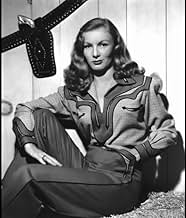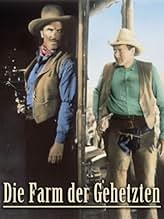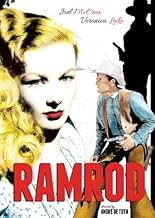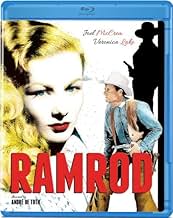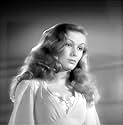Ramrod
- 1h 34m
IMDb RATING
6.6/10
2K
YOUR RATING
Story about violent feud between Connie Dickason, the owner of the Circle 66 ranch and rancher Frank Ivey, the self-proclaimed boss of an otherwise public grazing land.Story about violent feud between Connie Dickason, the owner of the Circle 66 ranch and rancher Frank Ivey, the self-proclaimed boss of an otherwise public grazing land.Story about violent feud between Connie Dickason, the owner of the Circle 66 ranch and rancher Frank Ivey, the self-proclaimed boss of an otherwise public grazing land.
Charles Ruggles
- Ben Dickason
- (as Charlie Ruggles)
Houseley Stevenson
- George Smedley
- (as Housely Stevenson)
Ward Wood
- Link Thoms
- (as Robert Wood)
Victor Potel
- Burch Nellice
- (as Vic Potel)
6.62K
1
2
3
4
5
6
7
8
9
10
Featured reviews
A Brutal Western
This was a surprisingly brutal western, more like a film noir from the late 1940s, with rough characters who shot first and thought later.
Among those with the rough attitudes was the female lead, Veronica Lake, who was nearing the end of her short career. Without the makeup and long blonde hair, she didn't look that pretty. The good guys were played by Joel McCrea and Donald Crisp.
Almost everyone in this film gets shot or killed. Many critics labeled this a B-movie but it sure had a lot of well-known actors for that label. Preston Foster, Don DeFore and Lloyd Bridges also star. The only actor who sounded B movie-ish was Arleen Whalen. Despite her good looks, I can see why she never made it to stardom.
I like black-and-white but this was film that would have looked better in some nice Technicolor with the great mountain scenery that was featured.
Among those with the rough attitudes was the female lead, Veronica Lake, who was nearing the end of her short career. Without the makeup and long blonde hair, she didn't look that pretty. The good guys were played by Joel McCrea and Donald Crisp.
Almost everyone in this film gets shot or killed. Many critics labeled this a B-movie but it sure had a lot of well-known actors for that label. Preston Foster, Don DeFore and Lloyd Bridges also star. The only actor who sounded B movie-ish was Arleen Whalen. Despite her good looks, I can see why she never made it to stardom.
I like black-and-white but this was film that would have looked better in some nice Technicolor with the great mountain scenery that was featured.
Striking casting, complex script, brilliant cinematography add up to a special, fascinating Western
I won't comment on what has been written by several others here, regarding the noir-ish qualities of the material. I do want to mention some things that caught me off guard, in a very good way, from the moment the film began. First off, the writers and director de Toth were confident enough in their material not to spoonfeed their audience. Indeed, the first few minutes are so opaque it seems as if we may have come in in the middle of the film. In reality, we've come in in the middle, not of the film, but of the characters' lives, and the filmmakers allow us to figure out what's going on much as a stranger arriving in town would have to figure out what this drama is that's occurring around him. Adding to the intelligent and innovative approach to the story is the cinematography of Russell Harlan. Harlan, who shot Red River, Lust for Life, The Big Sky, and To Kill a Mockingbird, certainly knew how to place a camera and light a scene. For de Toth, Harlan's camera moves almost constantly, innumerable dolly shots (far more than in a typical film of this day) both reveal and obfuscate the settings in such a way as to keep the viewer always a little off-balance as to where the action is moving next. It's a skillful means of unsettling the viewer. The casting as well performs similarly. Joel McCrea is a familiar figure in Western leading roles, but here he's both a reformed drunk and so soft-spoken and comparatively passive as to be almost the antithesis of what we expect. Veronica Lake gets one soft scene with her hair down and almost peekabooing, but for the rest of the film it's up tight on her head, and she's up tight in the role. She's an interesting case, a pitiable femme fatale, a nice girl at first pushed then willingly galloping down the wrong road. Charlie Ruggles, typically a comic father type, here is stern but not heartless, wrongheaded but goodhearted. And the best piece of off-beat casting in the film is light comedian Don DeFore as the rascally, promiscuous, and deadly Bill, a gunman with a seductive smile and the grim good humor that one both fears and wants to protect. DeFore's performance is the best I've ever seen him give, and it made me wish he'd done more like this. Thankfully (and oddly), the script gives him plenty of screen time, much more in fact (toward the end) than one would expect, given that he's not the lead in the picture. There have been bad good-guys like Bill in scores of Westerns before and since, but few with the charisma and style that Don DeFore brings to this one. All in all, I was amazed by the complexity and shades of gray in this film, which I completely expected to be just another good old shoot-em-up. Well worth watching.
A Grim Western
Veronica Lake in her memoirs said that Joel McCrea was one of the kindest, most decent men she ever knew or worked with. When she was writing that she was talking about Sullivan's Travels which is certainly one of the high points in both of their careers.
Ramrod is light years from Preston Sturges. Based on a Luke Short novel it's a pretty grim and violent film. Preston Foster is the owner of the big spread in the neighborhood and a close ally of his is Charlie Ruggles who has an adjoining piece of territory. Foster's taken a shine to Ruggles daughter Veronica Lake, but she can't stand the sight of him. When Foster bullies her fiancé out of town, Lake wants vengeance.
She's got her own piece of land now and hires Joel McCrea to run it for her. The range war starts, but Lake thinks McCrea is too soft in his approach. She starts some backchannel schemes of her own.
The result of this is a whole lot of dead bodies piling up. A windfall for the coroner.
As always Joel McCrea is the moral centerpiece of the film, he's once again the gallant western hero. Preston Foster is the town bully you love to hate. Foster did a variation on this part again in Law and Order a few years later.
Cast against type are Don DeFore and Charlie Ruggles. DeFore who was usually the hero's best friend and a jovial kind of guy, is a violence prone sort of fellow, who Lake manipulates among others. And it is hard to believe that Charlie Ruggles ever played anyone as serious on film before or since. Our image of him is usually the henpecked husband opposite Mary Boland from the Thirties.
This film is significant for Lake because she married Director Andre DeToth. DeToth claims to have been married seven times, but only three are listed on his page at IMDb. It was not a happy union, but DeToth did get a good performance out of his bride.
Ramrod may be one of the earliest examples of an adult western. It is grim and violent, but fascinating.
Ramrod is light years from Preston Sturges. Based on a Luke Short novel it's a pretty grim and violent film. Preston Foster is the owner of the big spread in the neighborhood and a close ally of his is Charlie Ruggles who has an adjoining piece of territory. Foster's taken a shine to Ruggles daughter Veronica Lake, but she can't stand the sight of him. When Foster bullies her fiancé out of town, Lake wants vengeance.
She's got her own piece of land now and hires Joel McCrea to run it for her. The range war starts, but Lake thinks McCrea is too soft in his approach. She starts some backchannel schemes of her own.
The result of this is a whole lot of dead bodies piling up. A windfall for the coroner.
As always Joel McCrea is the moral centerpiece of the film, he's once again the gallant western hero. Preston Foster is the town bully you love to hate. Foster did a variation on this part again in Law and Order a few years later.
Cast against type are Don DeFore and Charlie Ruggles. DeFore who was usually the hero's best friend and a jovial kind of guy, is a violence prone sort of fellow, who Lake manipulates among others. And it is hard to believe that Charlie Ruggles ever played anyone as serious on film before or since. Our image of him is usually the henpecked husband opposite Mary Boland from the Thirties.
This film is significant for Lake because she married Director Andre DeToth. DeToth claims to have been married seven times, but only three are listed on his page at IMDb. It was not a happy union, but DeToth did get a good performance out of his bride.
Ramrod may be one of the earliest examples of an adult western. It is grim and violent, but fascinating.
From now on, I'm going to make a life of my own. And, being a woman, I won't have to use guns.
Ramrod is directed by Andre DeToth and collectively written by Luke Short, Jack Moffitt, C. Graham Baker and Cecile Kramer. It stars Joel McCrea, Veronica Lake, Don DeFore, Donald Crisp, Preston Foster, Arlene Whelan and Charles Ruggles. Music is by Adloph Deutsch and cinematography by Russell Harlan.
Sick of self proclaimed bully boss of the valley Frank Ivey (Foster) getting his way, hard driven Connie Dickason (Lake) sets up the Circle 66 Ranch. Hiring Dave Nash (McRea) as her ranch foreman (ramrod), Connie uses tricks and feminine wiles to win the personal battles to hand - which may well spell bad news for everyone...
Ramrod was the first Western directed by De Toth, and it's quite an impressive genre start. Splendidly capturing the film noir zeitgeist that was occurring at this time, pic looks terrific, De Toth and Harlan bring perfect monochrome moodiness for narrative compliance. The story pulses with psychological beats, the characters ranging from damaged addicts, the lovelorn and the lost, the power crazy and the cowardly, and right there at the core of it all is a femme fatale who is very much all woman but manipulative, bitter and destructive to the bone!
Story has a number of splinters lifting it out of the ordinary, the twists and turns not ridiculous, the sly machinations of principals are devilishly enjoyable for the like minded noir of heart. The plotting is clinically smart by not being ordinary, De Toth toying with the traditional tropes of the good versus bad Western staples. It's fair to say that Ramrod will reward more on further viewings, where it has the power to have the viewer dissecting the Freudian angles on show.
Cast are well suited to their respective roles. Lake rightly deglamourizes for Connie, and yet she carries a steely sexiness that has you understanding how men fall under her spell. McRea underplays it perfectly, he got the dupe role down pat, whilst DeFore steals the men acting honours as Bill Schell, who is Dave's mate, a jumping bean loose cannon dealing death with a nod and a wink. Support cast all come out in credit to seal the deal, for Ramrod is a must see for those who like Western and film noir hybrids. 8/10
Sick of self proclaimed bully boss of the valley Frank Ivey (Foster) getting his way, hard driven Connie Dickason (Lake) sets up the Circle 66 Ranch. Hiring Dave Nash (McRea) as her ranch foreman (ramrod), Connie uses tricks and feminine wiles to win the personal battles to hand - which may well spell bad news for everyone...
Ramrod was the first Western directed by De Toth, and it's quite an impressive genre start. Splendidly capturing the film noir zeitgeist that was occurring at this time, pic looks terrific, De Toth and Harlan bring perfect monochrome moodiness for narrative compliance. The story pulses with psychological beats, the characters ranging from damaged addicts, the lovelorn and the lost, the power crazy and the cowardly, and right there at the core of it all is a femme fatale who is very much all woman but manipulative, bitter and destructive to the bone!
Story has a number of splinters lifting it out of the ordinary, the twists and turns not ridiculous, the sly machinations of principals are devilishly enjoyable for the like minded noir of heart. The plotting is clinically smart by not being ordinary, De Toth toying with the traditional tropes of the good versus bad Western staples. It's fair to say that Ramrod will reward more on further viewings, where it has the power to have the viewer dissecting the Freudian angles on show.
Cast are well suited to their respective roles. Lake rightly deglamourizes for Connie, and yet she carries a steely sexiness that has you understanding how men fall under her spell. McRea underplays it perfectly, he got the dupe role down pat, whilst DeFore steals the men acting honours as Bill Schell, who is Dave's mate, a jumping bean loose cannon dealing death with a nod and a wink. Support cast all come out in credit to seal the deal, for Ramrod is a must see for those who like Western and film noir hybrids. 8/10
Ramrod review
Nice guy Joel McCrea is torn between pint-sized femme fatale Veronica Lake and decent seamstress Arleen Whelan in this serviceable Western from the under-valued Andre De Toth. McCrea looks a little lightweight compared to Don Defore and Preston Foster, who stand out as a free-wheeling gun for hire with ambiguous intent and a rancher's heavy with a town under his thumb in a film that's brimming with bad guys. The plot twists and turns, but never quite takes off.
Did you know
- TriviaAt the time of filming, Veronica Lake and director André De Toth were married. This film was their first screen collaboration.
- GoofsActor Houseley Stevenson's name is misspelled onscreen as "Housely."
- Quotes
Connie Dickason: From now on, I'm going to make a life of my own. And, being a woman, I won't have to use guns.
- ConnectionsReferenced in You Must Remember This: Veronica Lake (Dead Blondes Part 4) (2017)
Details
Box office
- Budget
- $2,000,000 (estimated)
- Runtime
- 1h 34m(94 min)
- Color
- Aspect ratio
- 1.33 : 1
Contribute to this page
Suggest an edit or add missing content



